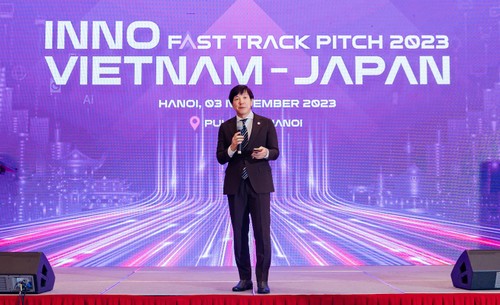 Nakajima Takeo, Chief of Representative of JETRO Hanoi, speaks at the award ceremony (Photo: Jetro Hanoi) Nakajima Takeo, Chief of Representative of JETRO Hanoi, speaks at the award ceremony (Photo: Jetro Hanoi) |
Bao Tram: Could you brief us about the “Inno Vietnam – Japan Fast Track Pitch 2023” program?
Nakajima Takeo: JETRO and the Ministry of Economy and the Ministry of Trade and Industry hold this event in Singapore, Indonesia, Thailand, and Vietnam. Each country has a unique potential to help solve social issues like energy, transportation, fintech and healthcare. So we’re going to invite many potential investors and startups to collaborate with the Japanese and Vietnamese companies. The purpose is to collaborate in solving one issue between Japan and Vietnam.
Bao Tram: What do you expect from this model in Vietnam?
Nakajima Takeo: Japan needs innovations and Vietnam needs innovations to make breakthroughs in the economy. We need a new technology, a new service, or a new business model to spur the economy. And we see lots of business opportunities to help Vietnam improve its economy. In terms of energy, for example, Vietnam should target carbon neutrality by 2050, but provide stable electricity and green electricity as well. That's one thing Japan can contribute to the growth of Vietnam’s economy.
Bao Tram: What do you think of the quality of this year’s entries?
Nakajima Takeo: We are hearing pitches and we are impressed at how well they are defined. Of course, there is a lot of back and forth between the challenge owners and the startups. They discussed many issues before making their pitches and, of course, these are still underdeveloped areas in the ecosystem of Vietnam. Vietnam has unique potentials. It has abundant IT engineers, programmers, and talented young entrepreneurs. And a big population – 100 million – creates a huge opportunity for international players in Japan. I believe this competition makes the players sharpen their approaches, as I said, so we’ll continue to hold this kind of event.
Bao Tram: In what areas should Vietnamese startups be focused?
Nakajima Takeo: That's a good question. I believe there are a couple of untapped potential markets. First is green energy. Vietnam faces a very difficult situation – it needs to reduce its carbon footprint while also providing stable energy. It's a very difficult situation. That's one thing. Another thing is healthcare. Vietnam's healthcare system is not providing coverage to all the Vietnamese people. Japan, on the other hand, has a reputation for providing good universal healthcare. DEX – a personal CRM (Customer Relationship Management) tool – helps healthcare providers provide better healthcare to everyone, particularly people in remote areas. Big cities like Hanoi and Ho Chi Minh are okay, but remote areas lack good healthcare. So healthcare, energy…and probably transportation, Vietnam still relies on motorbike transportation, but it needs a bigger, more sophisticated transportation system that can, for example, keep food at a certain temperature and humidity and deliver perishable products on time. So that kind of transportation system is needed.
Bao Tram: The model has been replicated in several other Asian countries. How does Vietnam compare with Singapore, Thailand, and Indonesia?
Nakajima Takeo: Indonesia and Vietnam have the market as well as the technology. We can create startups with new technology and apply it to this market. In the case of Singapore, they have technology but need to apply it to another country. That's a particular difference between the two countries. Vietnam is a much bigger market. Vietnam and Indonesia are the two largest markets in ASEAN, so investors and technology companies are looking at these two markets. And in terms of regulation and government support and financing, the governments of both Thailand and Vietnam are very active in helping startups. It's a competition between the two nations, Vietnam and Thailand. The government should be friendly toward new investment or experiments –for example, delivery by drone. Is it regulated or can you do anything? That makes a huge difference. Or FinTech – it's a new technology where fraud or some unreliable scheme can destroy the trust of the people. The law must help startups, but also regulate them, and encourage innovation. The government plays a very important role.
Bao Tram: Thank you for talking to VOV.
Nakajima Takeo: Thank you.